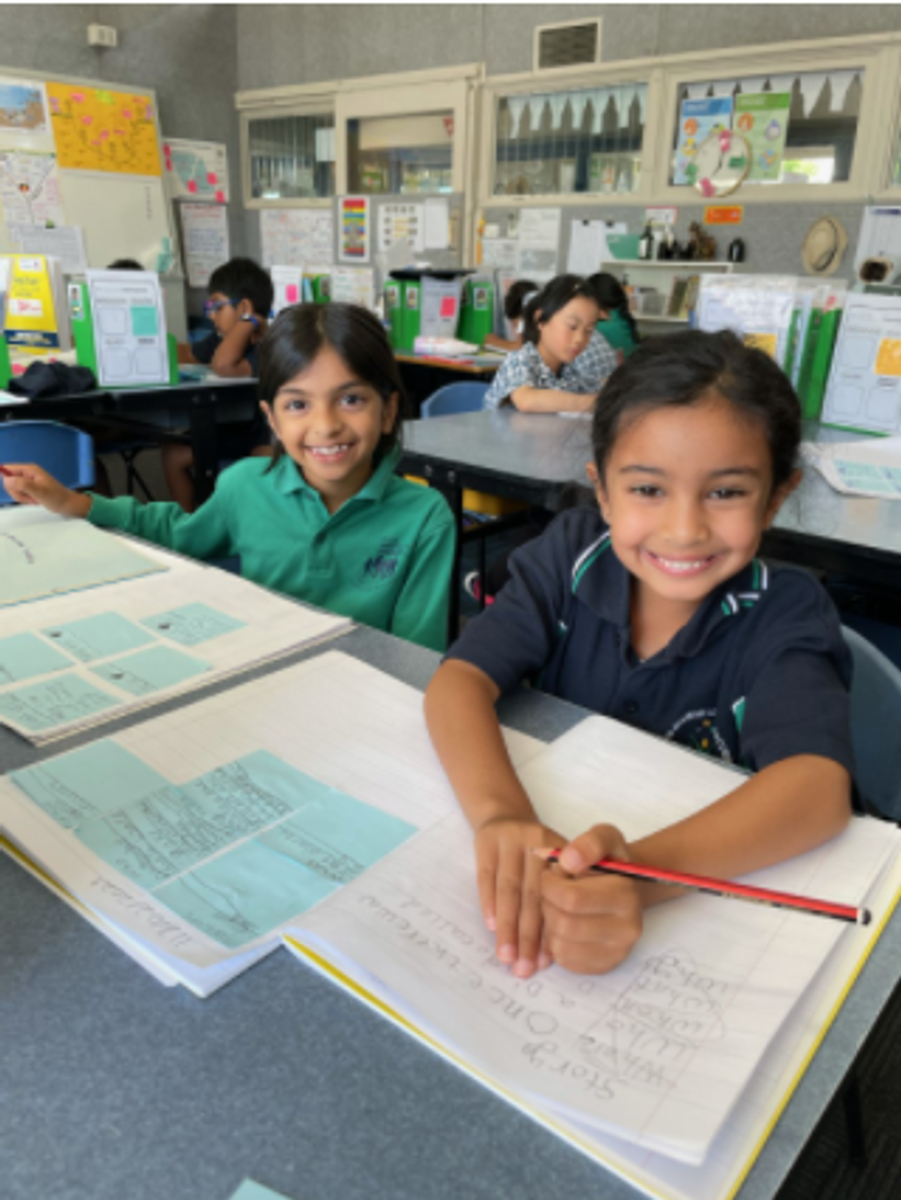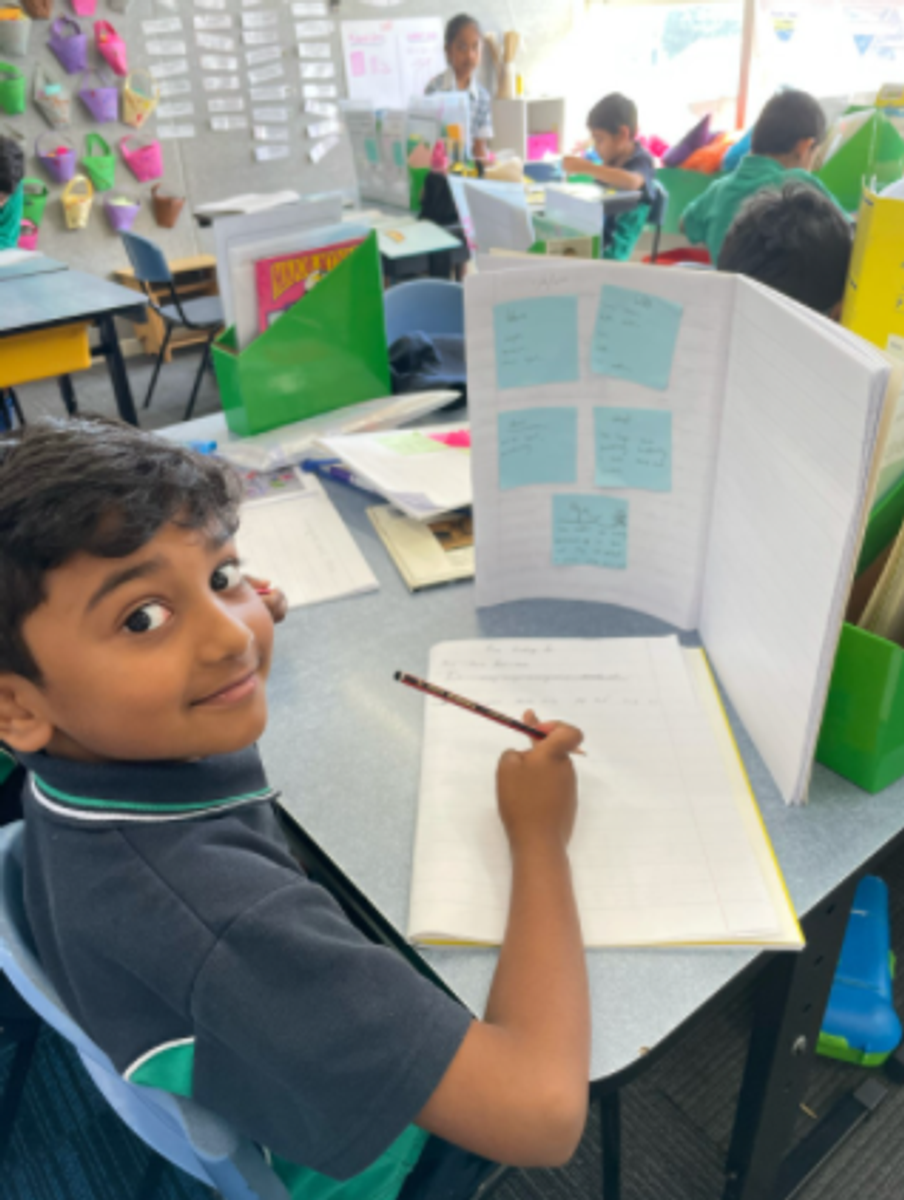Level 2 - Term 1 Overview

ENGLISH
Reading:
In Term One, Level One learners will deepen their understanding of the whole school approach, CAFÉ, by learning strategies from the areas of Comprehension, Accuracy, Fluency and Expand Vocabulary. The students will be explicitly taught how to apply strategies through reading workshops and sustained reading. To align with our Writing units, the learners will focus on building their knowledge of Recount and Narrative text structure by analysing texts. Furthermore, a focus on expanding vocabulary through mentor texts will enable learners to identify and transfer new and interesting vocabulary. Teachers will conference with students regularly to establish, assess and practise personalised learning goals to deepen reading skills.
Writing:
In Writing, students are investigating different writing genres and their supporting their development as an author thought connections to the whole school approach, VOICES. Learning experiences through Voice, Organisation, Ideas, Conventions, Excellent Word Choice and Sentence Fluency will support students in their writing journey. Students will also be immersed in a world of writing exploration through both ‘Sustained Writing’ to increase writing stamina and ‘Seed Creation’ to develop their ideas and create depth in their writing. Students will have regular writing conferences with their teacher to set personalised writing goals that are tailored to their need and to ensure they are supported throughout their journey as authors.
Spelling:
In Spelling, students will engage with Spelling Inquiry sessions to investigate sound blends, spelling patterns, generalisations and exceptions. These learning experiences are designed to provide our students with interactive workshops to develop a deeper knowledge of spelling. Students will select five words they want to learn from our spelling focus and five personalised words which are generated from their writing. They will be explicitly taught how to use Look, Say, Name, Cover, Write, Check (LSNCWC) strategy to practise their words and will be encouraged to use their personalised words in their writing throughout the week. Please note they will keep their spelling words for two weeks to ensure they have had sufficient time to master them.
Speaking and Listening:
Speaking and Listening is integrated into all areas of the curriculum. In each learning task, students are provided with opportunities to share their thinking, ideas, opinions, reflections and learning with their classmates.
To support your child’s learning at home, you could:
• Read with your child each night.
• Encourage your child to use the program Reading Eggs/Eggspress where they can explore digital texts and engage in comprehension and reading tasks.
• Create a reflective journal to write for an authentic purpose.
• Encourage students to plan their writing through drawing pictures and using adjectives to deepen descriptive writing.
• Practise with your child on his/her fortnightly spelling words.
MATHEMATICS
Mathematics is a key component of the Year 2 curriculum, with students exploring concepts through the application of SURF (Problem Solving, Understanding, Reasoning and Fluency). Core topics in Term One include investigations into calendars, place value, addition and subtraction. Students will engage in ‘Maths Talks’ to develop their reasoning and communication skills, as well as be supported to generate and progress towards personalised SURF goals.
In Term 1 the students will be learning about Number & Algebra focusing on Place Value and Addition and Subtraction strategies and Measurement and Geometry focusing on the connections between days, months and seasons. They will develop their knowledge and understanding focusing building their problem solving, understanding, reasoning and fluency skills in Mathematics.
To support your child’s learning at home, you could:
- Ask your child what their current SURF goal is. What have been their successes and challenges? What is their ‘next step’?
- Encourage them to engage in everyday mathematical activities with the family (such as measuring in cooking, adding up while shopping).
- Ensure your child completes their Maths Home Learning weekly.
- Make connections between related ideas and concepts.
- Read, write and say numbers using place value
- Explain their thinking through abstract, pictorial and concrete methods.
- Break numbers into their place value parts.
- Describe strategies using step-by-step thinking.
- Represent number facts using concrete, pictorial and abstract strategies.
INQUIRY
This term, students will explore the question ‘How to build healthy relationships with others?’ by distinguishing the difference between healthy and non-healthy relationships. Students will identify healthy relationships in their lives and learn the importance of developing strategies to continue improving existing relationships. Students will learn the importance of belonging and build awareness of other people’s emotions, recognising diversity and difference. They will develop self-talk strategies, create partnerships with others and have opportunities to demonstrate their persistence.
To support your child’s learning at home, you could:
- Discuss the significance of positive relationships.
- Discuss different strategies to strengthen relationships.
YCDI
The Level Two team integrates the You Can Do It Program into our weekly teaching and learning. YCDI focuses on the development of organisation, confidence, persistence, resilience and getting along as we endeavour to develop the social, emotional and self-regulation skills of our young learners. YCDI is a comprehensive framework that incorporates the latest research into developing the social and emotional characteristics of student and exploring how social skills can influence outcomes
Students will draw connections to our Inquiry unit to understand the importance of getting along with others by accepting them and understanding their feelings and emotions. Students will reflect on how actions affect the wellbeing of self and others, allowing them to deepen their understanding of their social and emotional selves.


